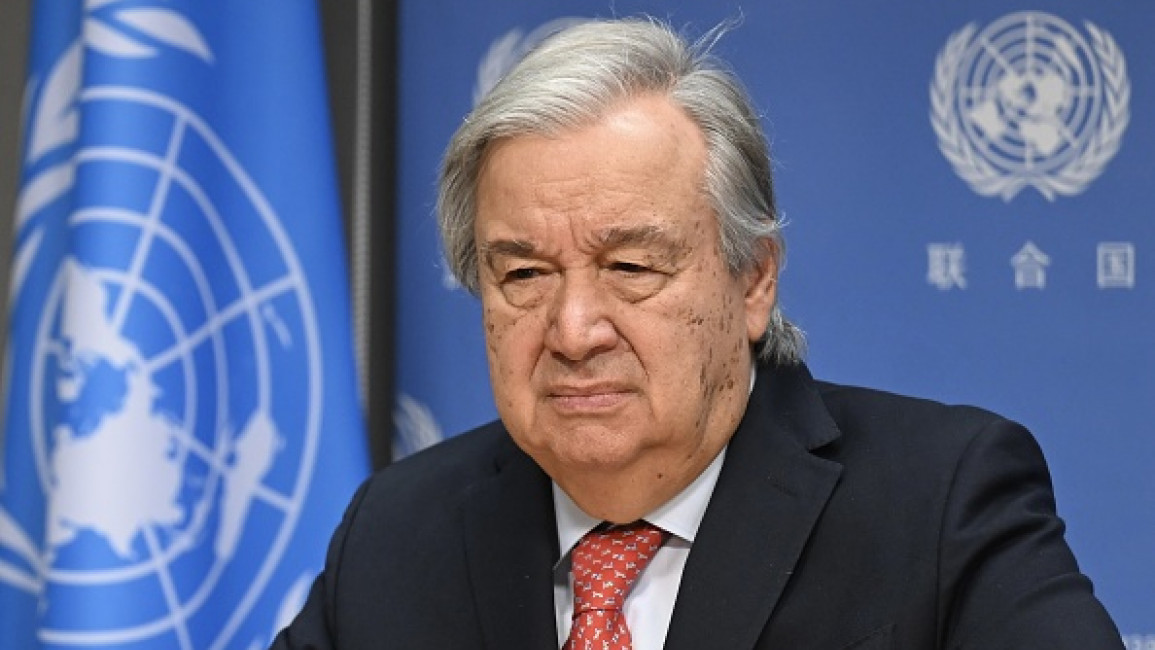The New Arab Staff
12 December, 2023
Is the General Assembly able to step in when the Security Council is unable to make a decision to stop Israel's war on Gaza?

UN Secretary-General Antonio Guterres invoked Article 99 of the UN Charter [Getty]
Many are hoping that a vote on Tuesday in the UN General Assembly on a non-binding resolution demanding an immediate humanitarian ceasefire will demonstrate widespread global support for ending Israel's onslaught on Gaza, now in its third month.
After the US vetoed a resolution in the Security Council on Friday demanding a humanitarian ceasefire, Arab and Islamic nations called for an emergency session of the 193-member General Assembly on Tuesday afternoon to vote on a resolution making the same demand.
But is the UN General Assembly able to step in when the Security Council is unable to decide to stop Israel's war on Gaza?
What power does the General Assembly have?
According to the General Assembly’s 1950 resolution 377A (V), widely known as "Uniting for Peace", if the Security Council is unable to act because of the lack of unanimity among its five veto-wielding permanent members, the Assembly has the power to make recommendations to the wider UN membership for collective measures to maintain or restore international peace and security.
For instance, most frequently, the Security Council determines when and where a UN peace operation should be deployed, but historically, when the Council has been unable to make a decision, the General Assembly has done so.
For example, in 1956, the General Assembly established the First UN Emergency Force (UNEF I) in the Middle East.
In addition, the General Assembly may meet in an Emergency Special Session if requested by nine members of the Security Council or by a majority of the Members of the Assembly - as it is doing on Tuesday.
However, unlike Security Council resolutions, General Assembly resolutions are non-binding, meaning that countries are not obligated to implement them.
RELATEDIn-depthAlexander Langlois
Intervention for Ukraine
To date, the General Assembly has held 11 Emergency Special Sessions - eight of which have been requested by the Security Council.
On 27 February 2022 - shortly after Russia invaded Ukraine - the Security Council decided to call an Emergency Special Session of the General Assembly in its resolution 2623 (2022) due to a lack of unanimity among its permanent members, preventing it from exercising its primary responsibility of "the maintenance of international peace and security".
As a result, on 1 March 2022, the General Assembly, meeting in an emergency session, adopted a resolution by which it deplored "the aggression by the Russian Federation against Ukraine in violation of Article 2 (4) of the Charter". It also demanded Moscow immediately cease its use of force against Ukraine and completely and unconditionally withdraw all of its military forces from the territory of Ukraine within its internationally recognised borders.
On 26 April, amid growing criticism of the lack of action by the Security Council to stop the war in Ukraine, the General Assembly adopted by consensus a landmark resolution requiring the five permanent members of the Council to justify their use of the veto.
While the General Assembly's resolutions are not legally binding, UN spokesperson Stephane Dujarric said on Monday that the assembly’s messages "are also very important" and reflect world opinion.
RELATED
UN response to the war on Gaza
Riyad Mansour, the Palestinian ambassador to the United Nations, said on Sunday that the defeated resolution in the Security Council was cosponsored by 103 countries, and he is hoping for more cosponsors and a high vote for the General Assembly resolution on Tuesday.
In the first UN response to the war on Gaza, the General Assembly on 27 October called for a "humanitarian truce" leading to a cessation of hostilities. The vote was 120-14 with 45 abstentions.
After four failures, the Security Council on 15 November adopted its first resolution, calling for "urgent and extended humanitarian pauses" in Gaza to address the escalating crisis for Palestinian civilians during Israel's relentless aerial and ground attacks.
That vote in the 15-member council was 12-0 with the US, UK, and Russia abstaining.
The US and UK said they abstained because the resolution did not condemn Hamas’ 7 October attack on Israel, and Russia because it failed to demand a humanitarian ceasefire, which Israel and the United States oppose.
As the death toll in Gaza has mounted during Israel’s onslaught on the besieged enclave, calls for a ceasefire have escalated, and on Friday the US was isolated in its support for Israel in the Security Council, where the vote was 13-1 with the United Kingdom abstaining.
The Security Council meeting and vote last Friday were a response to a letter from UN Secretary-General Antonio Guterres, who invoked Article 99 of the UN Charter, which enables a UN chief to raise threats he sees to international peace and security.
He warned of a "humanitarian catastrophe" in Gaza and urged the council to demand a humanitarian ceasefire.
Guterres said he raised Article 99 - which hadn’t been used at the UN since 1971 — because "there is a high risk of the total collapse of the humanitarian support system in Gaza".
The UN anticipates this would result in "a complete breakdown of public order and increased pressure for mass displacement into Egypt", he warned.
Gaza was at "a breaking point" and desperate people were at serious risk of starvation, Guterres said, stressing that Hamas' attack on Israel "can never justify the collective punishment of the Palestinian people".
Agencies contributed to this report.
No comments:
Post a Comment